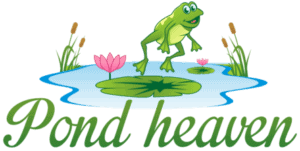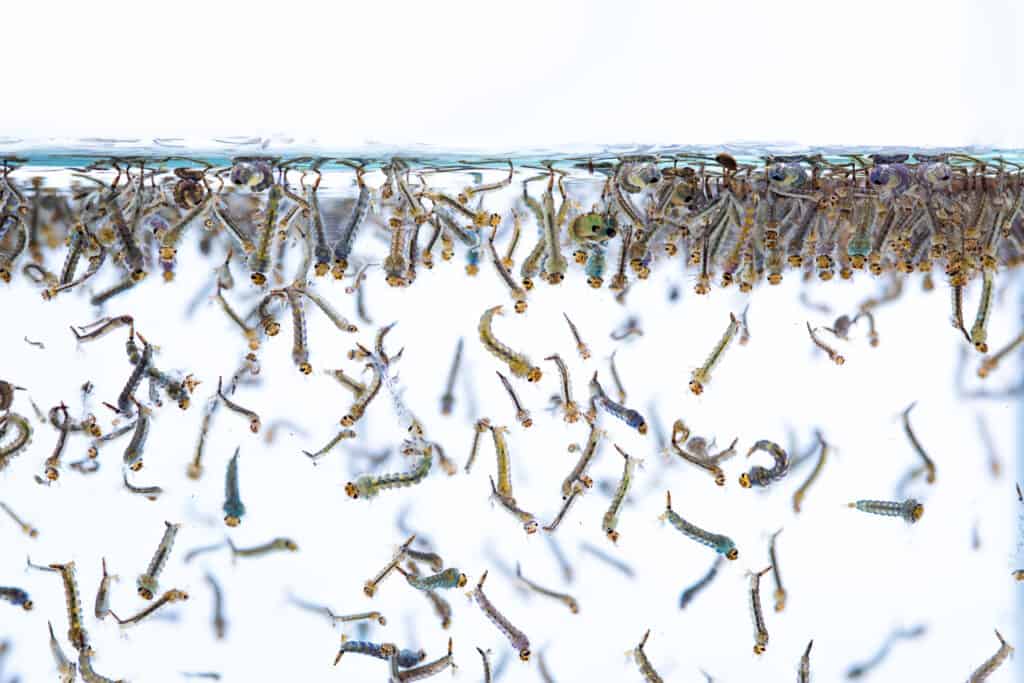
Koi fish are eye-catching creatures and are relatively easy to care for as they will eat just about everything, even if it’s not good for them. Due to their adventurous feeding habits, some Koi owners might be concerned about what their fish eat when they are not looking. So, do Koi fish eat mosquito larvae?
Koi fish do eat mosquito larvae if they come across them in their pond. Mosquito larvae are not the most enticing food for Koi fish, so they might not eat the larvae if you already feed them a well-balanced diet. You should not rely on your Koi alone to control the mosquito larvae in your pond.
Are mosquito larvae good for Koi fish? Do Koi ponds attract a lot of mosquitos? How can you get rid of the mosquitos in your Koi pond and prevent them from returning in the future? Let’s find out!
Pro Tip: If you’re tired of wasting money and making costly mistakes on the koi-keeping hobby or are thinking about buying koi fish but don’t know where to start, I strongly suggest you check out this ebook. I recently read this ebook, and it contains SO much useful information, such as:
- 3 proven steps to identify koi fish diseases
- WARNING: 3 things you should NEVER do when it comes to caring for koi
- When to seek professional help when it comes to looking after your koi
Can Koi Fish Eat Mosquito Larvae?

Koi fish are strikingly beautiful animals known for their bright color patterns. Koi fish are fairly easy to care for as they have varied diets, but will Koi fish eat mosquito larvae?
Koi fish are ravenous eaters and tend to eat anything they see in their pond. Koi fish will try to eat almost anything as long as it’s small enough to fit in their mouths.
Koi fish will most likely wait for the mosquito eggs to hatch into larvae before they consume them, but Koi are likely to eat the mosquito larvae they come across.
However, mosquito larvae are not a favorite food for Koi fish, and if you feed your Koi regularly and supplement their feedings with the right foods for a balanced diet, then your Koi will probably not eat the mosquito larvae.
If you have mosquitos in your Koi pond, you should try other methods of getting rid of them, rather than relying on your Koi fish to eat them.
The Diet Of Koi Fish
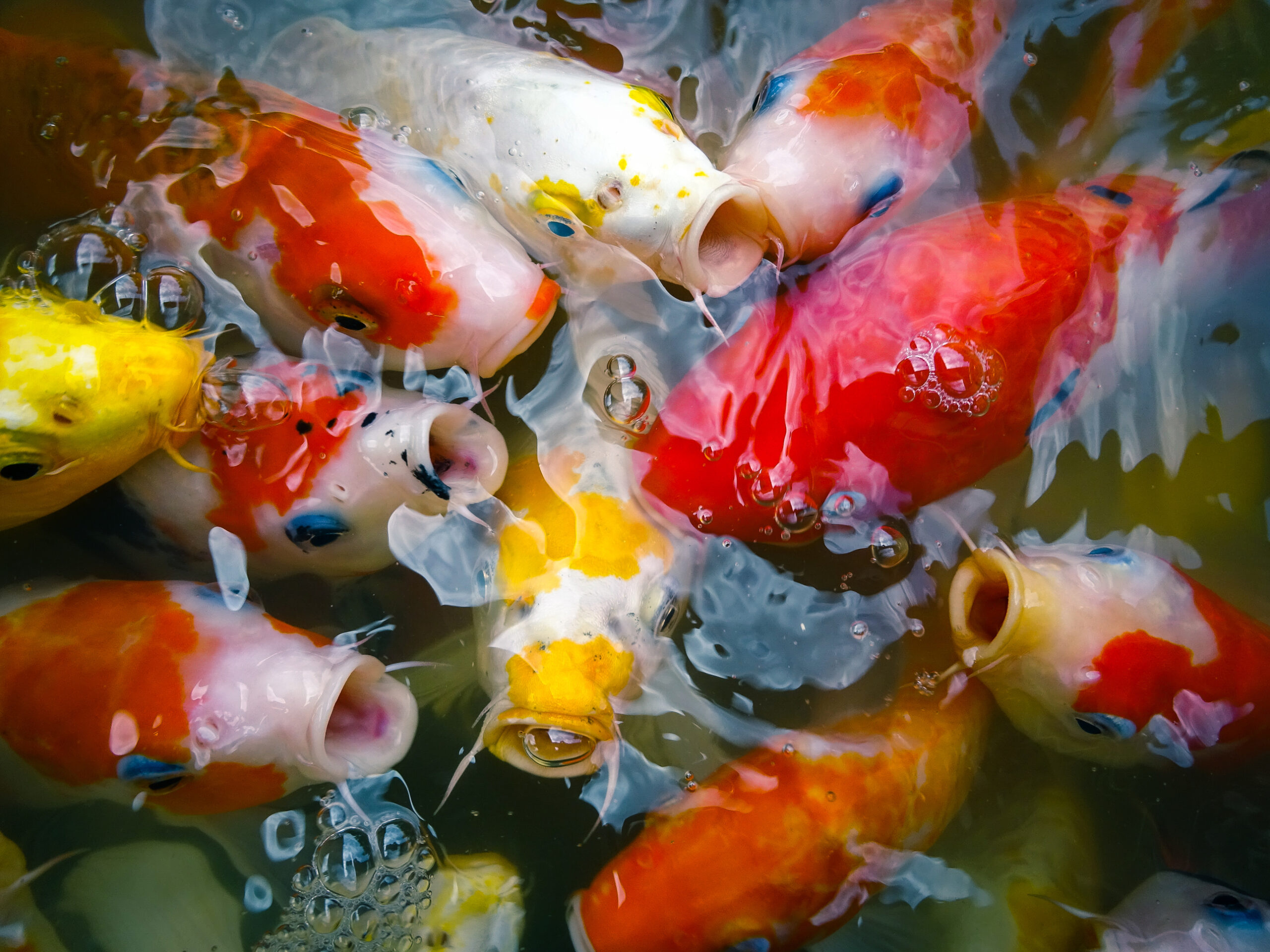
Koi fish require a well-balanced diet to stay healthy, but what does a well-balanced diet for Koi fish look like? Koi fish have wide-ranging appetites and are daring eaters, meaning they will try to eat anything you give them, even if it’s not good for them and they should not be eating.
It would help if you watched what your Koi fish eat and how much food they eat to help you avoid any possible problems that could affect your fish’s health, like a blockage in their digestive system.
Koi fish have dietary requirements you need to ensure are met, so your Koi fish can stay healthy. The main part of a Koi fish diet should consist of proteins. Proteins need to be about 35 to 40% of their regular diet.
You can supplement their protein portions with fruits and vegetables to ensure your Koi fish receive their needed mineral and vitamin intake. Fats make up about 5 to 10% of a Koi fish’s diet, but their fat intake should be increased to about 15% in fall and winter to help them survive the cold weather conditions.
Carbohydrates should make up a small percentage of a Koi’s diet, about 10% of the fish’s diet, as they have difficulty digesting carbs. The carbs you feed your Koi should be whole grain and nothing else. If you feed your Koi too many carbs in one go, this can lead to liver degeneration in your Koi.
A good way to assure your Koi are consuming a well-balanced diet is to feed them good quality, high-protein Koi fish pellets and supplement them with fruit and vegetables about four to five times a week, with grain included in their diets about once or twice a week.
Mosquito larvae can be a part of a well-balanced diet for your Koi fish, as they contain some nutrients they need. However, your Koi should not only consume Mosquito larvae as it won’t provide them with everything they need to stay healthy.
Are Mosquito Larvae Good For Koi Fish To Eat?
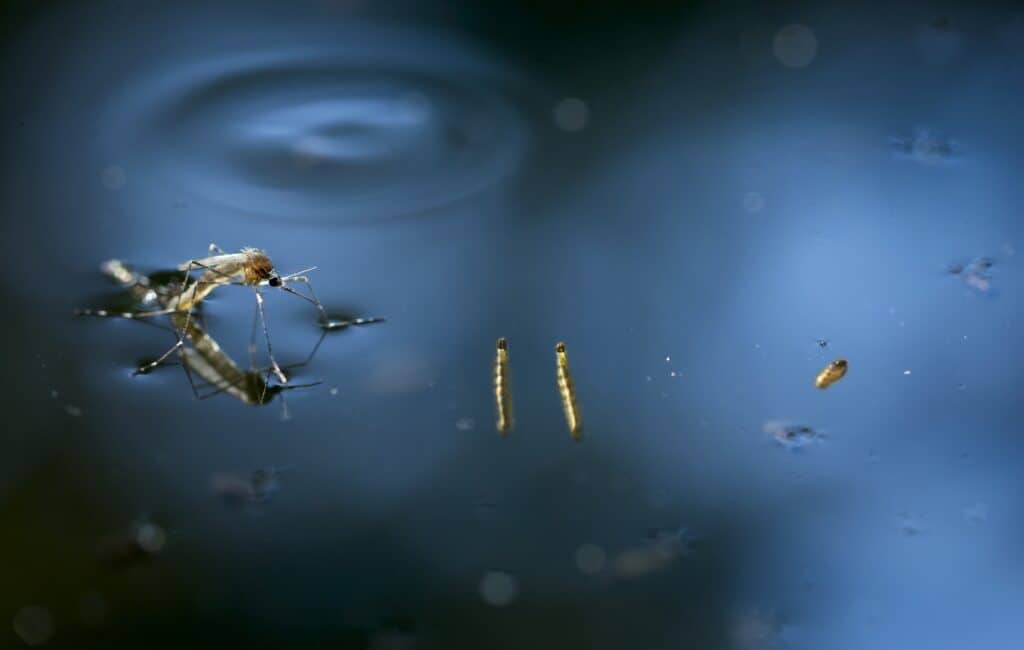
So, Koi fish can eat mosquito larvae, but are mosquito larvae good for Koi fish, or should you be concerned when you spot your Koi eating them?
Mosquito larvae are safe for Koi fish to consume. Mosquito larvae can offer your Koi fish some great nutritional benefits that can help improve the health of your Koi fish. Mosquito larvae are packed with protein, which Koi fish need in their diets.
Mosquito larvae can also help improve the health of your Koi’s skin and can help make the colors of your Koi stand out. Many aquarists with colorful fish breed their own mosquito larvae to feed their fish.
Koi that eat mosquito larvae are also more likely to have better breeding activity than those that don’t eat mosquito larvae. So, if you want to breed your Koi fish, feed them mosquito larvae. So, mosquito larvae are packed with nutrients to help keep your Koi fish healthy and happy.
You don’t need to worry about your Koi fish eating mosquito larvae. You might even be surprised by how intense your Koi’s color gets after eating the mosquito larvae; it might make you want to start breeding your own larvae.
Do Koi Ponds Attract Mosquitoes?
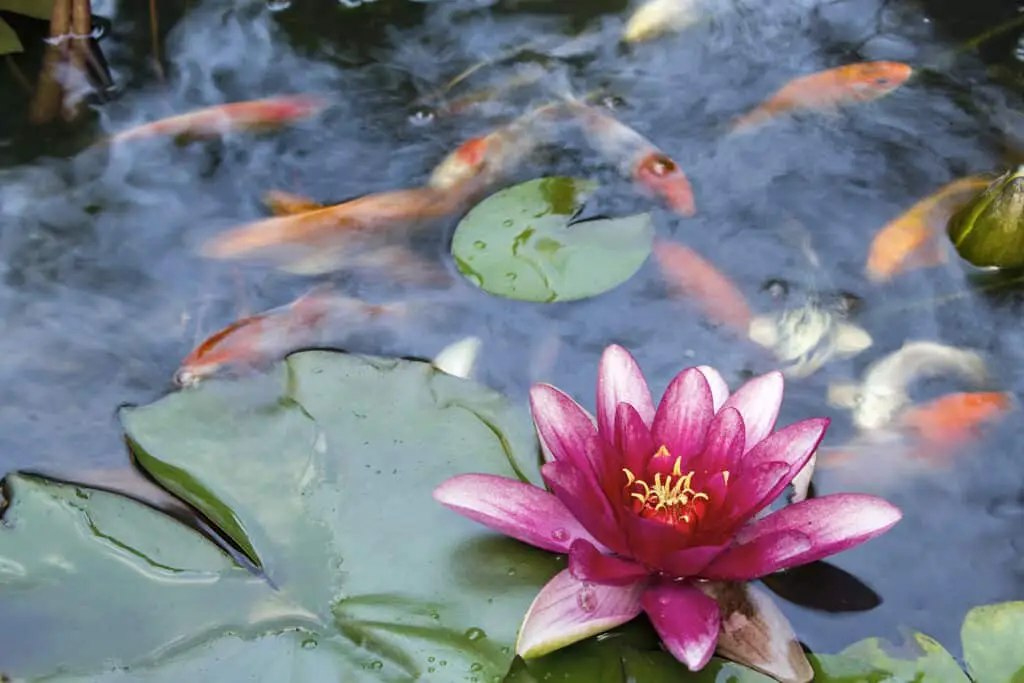
People who are starting their first Koi ponds might be worried about mosquitos, but do Koi ponds attract mosquitos? Well, this will depend on the type of Koi pond you have. Mosquitos generally breed and lay their eggs in stagnant waters for several reasons.
Mosquitos will not lay their eggs in moving water as the currents of the water could carry their eggs away, which means it’s not a secure place to lay them. Generally, Koi ponds do not have stagnant waters but rather moving waters, so they aren’t an ideal breeding place for mosquitos. However, mosquitos can be attracted to Koi ponds in certain rare situations. This usually happens when your Koi pond goes stagnant. When this occurs, you need to treat it as soon as possible, or this stagnant water could begin affecting the health of your Koi fish, and then mosquitos will be the least of your worries.
How Do I Get Rid Of Mosquitoes In My Koi Pond?
If you realize that there is an influx of mosquitos near your Koi pond, and you are worried that the mosquitos have laid their eggs in your Koi pond, then there are a couple of steps to take to rid your Koi pond of the mosquitos and their larvae.
As mentioned above, if you find mosquito larvae in your Koi pond, you might have a bigger problem than mosquito larvae. Before you get into any methods to rid your Koi pond of the mosquitos, you need to assess the water in your pond to see what is going on.
This should hopefully help you understand why your Koi pond is going stagnant and what you need to do to fix it before it begins affecting the health of your fish. Once you have done that, you can move on to the following ways to rid your Koi pond of mosquito larvae.
Use A Wildlife-Friendly Insecticide In Your Koi Pond
The first thing to do is buy a wildlife-friendly insecticide that you can place in your pond’s water to kill off any mosquito larvae that might be in the water.
It would help if you were extremely careful with this method, as you don’t want to harm your fish or any other wildlife that might use your Koi pond as part of their ecosystem.
So, you must ensure you use a chemical-free insecticide that is safe for Koi fish and won’t change the quality of the pond water too much. You should be able to find a wildlife-friendly insecticide at your local pond or aquarium store.
You should look for insecticides containing Bacillus thuringiensis israelensis, as this will easily kill off the mosquito larvae. Make sure you adhere to the instructions on the insecticide’s packaging as close as possible to ensure your fish’s health and the insecticide’s effectiveness.
Add More Mosquito Eating Creatures To Your Koi Pond
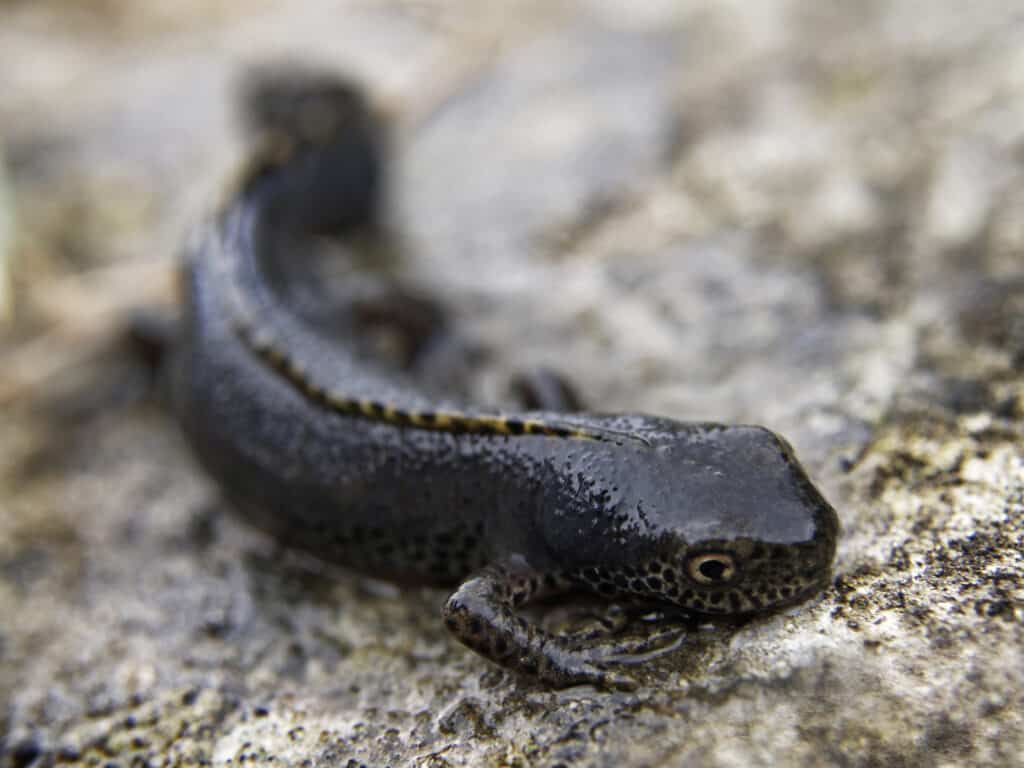
If you don’t want to go the way of insecticides due to ethical reasons or concerns for the health of your Koi fish, then you might want to consider this other option. Adding some other mosquito-eating animals to your Koi pond could help reduce the mosquito larvae population in your pond.
Some animals that love eating mosquito larvae include topminnows, tadpoles, and killifish, to name a few.
Many other aquatic animals will gladly make a meal out of mosquito larvae, so speak to your local aquarium store and ask what other animals you could add to your pond to help with this problem.
Be sure to stay away from mosquitofish, as most people claim they are not as effective in controlling the mosquito larvae population.
It would be better to introduce fish to your pond native to your area, as they will have a better chance of eating the mosquito larvae without threatening other native species and ecosystems in your area.
How To Keep Mosquitoes Out Of A Koi Pond
If you are concerned about mosquitos laying their eggs in your Koi pond and becoming a problem, you can utilize a few methods to help keep mosquitos out of your Koi pond. These methods are easy to do and should not take you long.
Some of these methods are not only needed to keep mosquitos out of your pond, but they can also help keep your Koi fish healthy.
The following methods of dissuading mosquitos from using your Koi pond should have been implemented when your Koi pond was built; if not, you should build them into your pond as soon as possible to help keep your Koi pond clean. So, let’s go through these methods to help keep mosquitos out of your Koi pond.
Control The Algae In Your Koi Pond
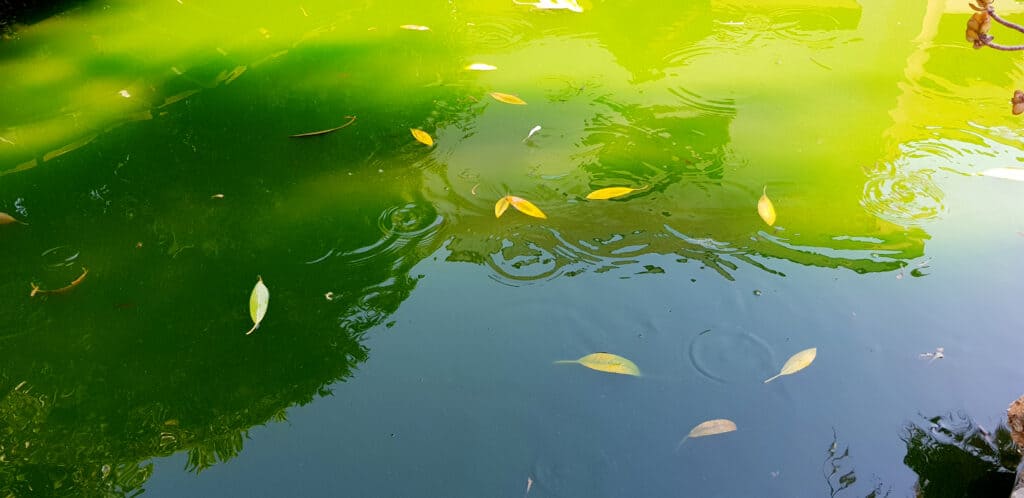
One of the best ways to help keep mosquitos from laying their eggs in your Koi pond is to actively control the mosquito larvae’s food source.
When mosquitos hatch and take on the larvae stage of their lives, they will feed on the algae and other similar organisms that grow and live in the water of your Koi pond. Algae is a favored food among mosquito larvae as it can help boost their growth due to the nutrients it holds.
This is unfortunate as Koi ponds are prone to developing a thick layer of algae on the walls and floor of the pond. However, if you control this food source, you are unlikely to have a problem with mosquitos in your Koi pond.
You can control the algae growth in your pond in two ways. You can use some wildlife-friendly algae killer chemicals that you should be able to find at your local aquarium store, or you can introduce algae-eating fish to your Koi pond.
Keep The Water In Your Koi Pond Moving
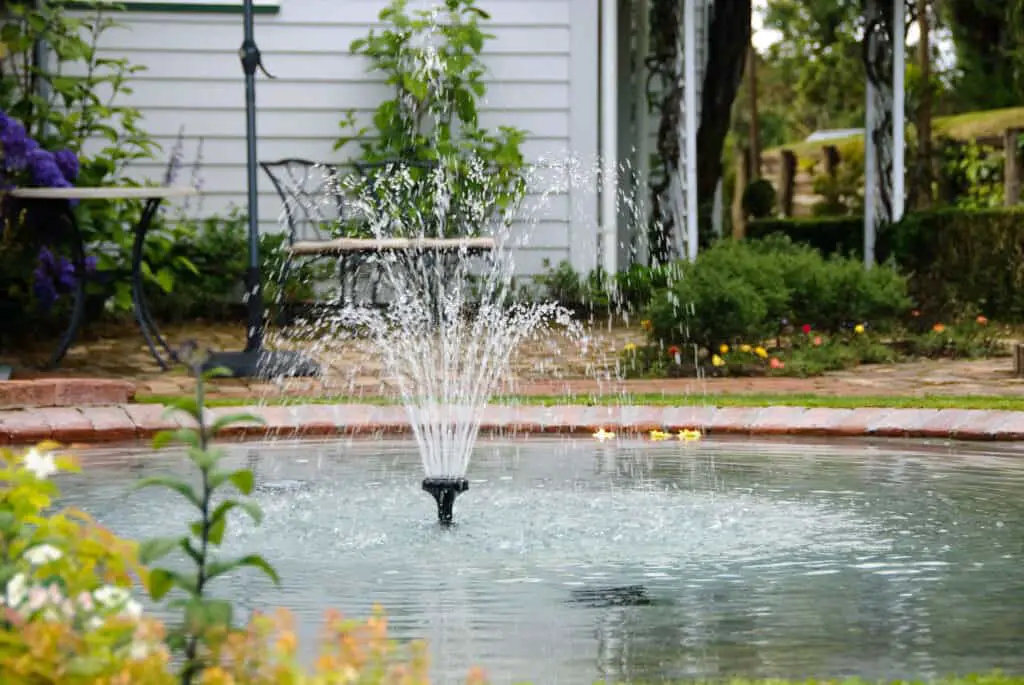
As we mentioned earlier, mosquitos will not lay their eggs in a source of water that is moving as the water’s current could damage the mosquitos’ eggs or wash them away. So, to help prevent the mosquitos from laying their eggs in your Koi pond, keep the water moving.
To keep the water moving, add a fountain or an electric aeration pump to your Koi pond. The pump or fountain does not need to be big; as long as it can give the water a current, it will be enough to stop the mosquitos from laying eggs in your pond.
A fountain or pump will also help keep your Koi pond clean as it will help control the growth of algae, further helping to keep mosquitos away from your pond.
Keep Surrounding Vegetation Neat And Trimmed
Adult mosquitos will live in areas that have moist plant life. So, the vegetation surrounding your Koi pond will be an area where mosquitos can thrive. It will help if you keep these areas of vegetation trimmed and neat to stop mosquitos from living in the plants.
This will help prevent mosquitoes from hanging around your Koi pond and laying their eggs in the water.
Conclusion
Koi fish are adventurous eaters and are likely to eat mosquito larvae that come across their path in the pond. However, mosquito larvae are not their favorite food, and they will not always eat the larvae, especially if you are feeding them a balanced diet.
So, if you have a mosquito problem in your Koi pond, it is good to use one of the other techniques mentioned above to rid your pond of the mosquitos.
You should then implement one, if not all, of the methods listed to help prevent mosquitos from laying their eggs in your pond. Good luck with riding your Koi pond of mosquito larvae!
References
https://atlantiswatergardens.com/do-koi-ponds-attract-mosquitos/
https://pondinformer.com/pond-fish-that-eat-mosquito-larvae/
https://helpusfish.com/50/koi/do-koi-eat-mosquito-larvae.html
